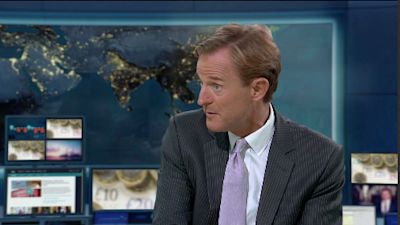Coronavirus: Government borrowing and UK's national debt explode due to lockdown

The lockdown of the economy has checked the spread of coronavirus but it also triggered a recession that has badly damaged the public finances. The government is borrowing money on a record-breaking scale, our stock of national debt is now the same size as our annual economic output. According to the Office for National Statistics, Public Sector Net Borrowing in June stood at £35.5 billion. Lower than in May but still five times the amount borrowed in June last year.
Coronavirus sees UK economy suffer largest fall since 1979 in first quarter
Worldwide economy to take £9.6 trillion Covid-19 hit, says IMF - and UK will be among worst affected
The government’s tax take has fallen, spending has exploded. In just three months (April - June), the UK borrowed 127.9 billion, more than twice the amount borrowed during the whole of the last financial year. The deficit - the difference between what the government spends and what it has coming in - should narrow in the months ahead, as emergency support for businesses and households is slowly withdrawn and the recovery (hopefully) gathers pace. But the Office for Budget Responsibility (OBR) calculates that the UK is on course to borrow c£370 billion this year - a record in peacetime.
The UK will emerge from this crisis heavily indebted. The level of that indebtedness will depend to large extent on many businesses fail and how much unemployment rises in the months ahead. The good news is that it has never been cheaper for the government to borrow money - low interest rates stretch out far into the horizon. Investors, here and abroad, continue to queue-up to lend the government money. The Bank of England, which holds almost a third of our national debt (£1.98 trillion), is merrily creating money to buy UK government debt with the same gusto that the government is issuing it. Remarkably, although government debt is ballooning, the cost of servicing that debt is forecast to be lower in future than it was in March.
But the public finances are self-evidently on an unsustainable path. We can probably jog-on with a higher debt burden but the pound is not a reserve currency, we can’t do it forever and a day. “Over the medium-term, we must, and we will, put our public finances back on a sustainable footing,” says the Chancellor, Rishi Sunak. Higher borrowing in response to COVID-19 was unavoidable. The OBR concludes that the alternative to emergency taxpayer support would have been far worse. For now, there is nothing to worry about but the UK is extremely exposed to future spikes in interest rates and inflation. Investor confidence can be lost, a reckoning is coming. And if the government keeps its pledge not to impose another round of austerity then significant tax rises look inevitable.